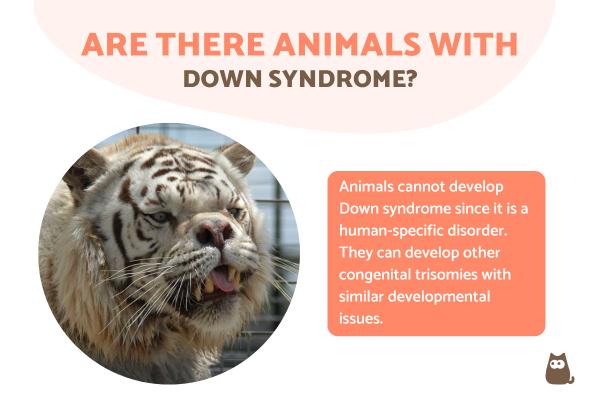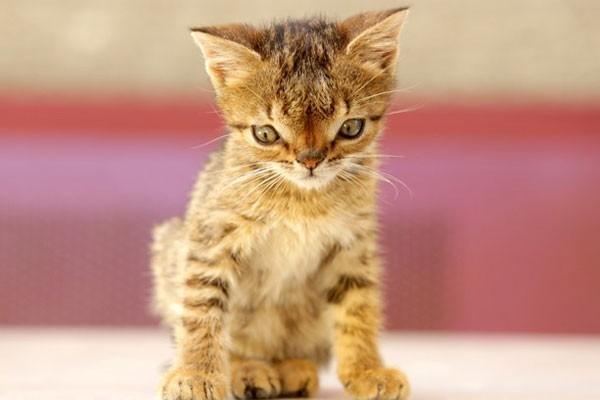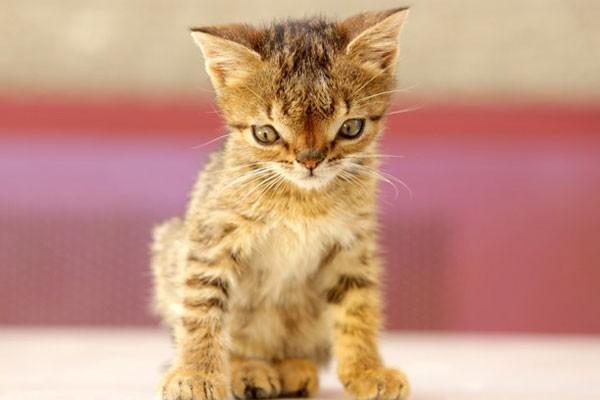Are There Animals With Down Syndrome?


There are many diseases and health disorders which can be found in both humans and animals. While there are diseases which can be contracted by both humans and animals, genetic disorders do not function in the same way. Some people may wonder whether animals can have Down syndrome because they have seen pictures of animals with facial features that imply this to be the case. However, Down syndrome is a congenital condition in humans which cannot develop in other species.
At AnimalWised, we find out more by asking are there animals with Down syndrome? Although animals cannot have Down syndrome the same as humans, there are congenital genetic conditions in animals which result in similar disorders.
What is Down syndrome?
To understand whether there are animals with Down syndrome, we must take a closer look at this condition. We do this by clarifying what exactly is Down syndrome and how it presents itself in humans.
The genetic information of a human being is contained in our chromosomes. These chromosomes are formed by DNA and are found in very complicated structures. They contain all of our genetic sequencing which is passed on from the parents. This genetic sequence generally determines the physiology of our body at birth and often the pathologies that we might encounter, even in later life.
Most human beings have 23 pairs of chromosomes. In the case of Down syndrome, people affected have an extra copy of chromosome 21. This is the circumstance which causes Down syndrome and it is medically known as Trisomy 21. It is not a disease, but a genetic disorder which is difficult to predict. A trisomy is a condition in cell nuclei where there is an extra copy of certain chromosomes (i.e. three instead of two).
Babies with Down syndrome are typically born to parents with normal genetic conditions and the forming of an extra chromosome seems to be a random act. This means it is not a hereditary disorder which is due to the genes passed down from the parents. It is a congenital disorder which occurs during the formation of the fetus, something which can happen to anyone.
This genetic alteration is responsible for the characteristic physical features that we observe in people affected by Down syndrome. It causes some degree of cognitive impairment and impaired growth in muscle tissue. Down syndrome is also associated with an increased risk of other diseases due to a lowered immune system. In turn, this generally lowers their life expectancy to around 50-60 years in developed countries.

Can animals also develop Down syndrome?
The simple answer is no, animals cannot develop Down syndrome. We should qualify what we mean to get a better understanding. In the case of Down syndrome, it is an exclusively human disease as the chromosomal organization of humans is different from that present in other animals.
However, there are animals which share certain genetic information with specific genetic sequences. In fact, gorillas have a DNA sequence that is similar to that of humans by about 97-98%.
Since animals have genetic sequences, they also have ordered chromosomes (chromosome pairs which depend on each species), so they can incur chromosomal problems similar to that of Down syndrome. These can translate into cognitive and physiological difficulties, as well as anatomical changes which change the animal's physical characteristics.
This happens for example in laboratory mice, some of which have been found to have a trisomy in chromosome 16. However, even if animals can suffer genetic alterations and some chromosome trisomies, they are not the same as Down Syndrome which is a uniquely human disease caused by the trisomy of chromosome 21.

What congenital disorders in animals are similar to Down syndrome?
As we have explained, animals cannot have Down syndrome. However, there are potentially subject to chromosomal disorders which can have similar physical and behavioral consequences in the animal. Some of the congenital disorders in animals similar to Down syndrome include:
- Other trisomies: we have already explained that Down syndrome is a type of trisomy, but additional chromosomes can also occur in animals which result in developmental problems.
- Albinism: while it is an inherited disease, albinism in animals can occur. It causes the skin and hair of animals to become white, but there are also related issues. These include a greater sensitivity to UV rays and a greater propensity toward problems such as deafness.
- Dwarfism: although dwarfism is poorly understood, we do know there is a genetic influence. For this reason, animals can develop dwarfism which makes them smaller than they otherwise would be and has other developmental issues. Learn more with our article on whether dogs can have dwarfism.
- Genetic diseases: not all congenital disorders have obvious physical symptoms such as albinism or dwarfism. Others may not even present symptoms until later in life. One example is hip dysplasia in dogs which usually occurs in middle age.
No we know that animals cannot develop Down syndrome, we may want to know about other genetic disorders they can develop. You can do so with our article on what is Cushing's syndrome in dogs?
If you want to read similar articles to Are There Animals With Down Syndrome?, we recommend you visit our Facts about the animal kingdom category.







